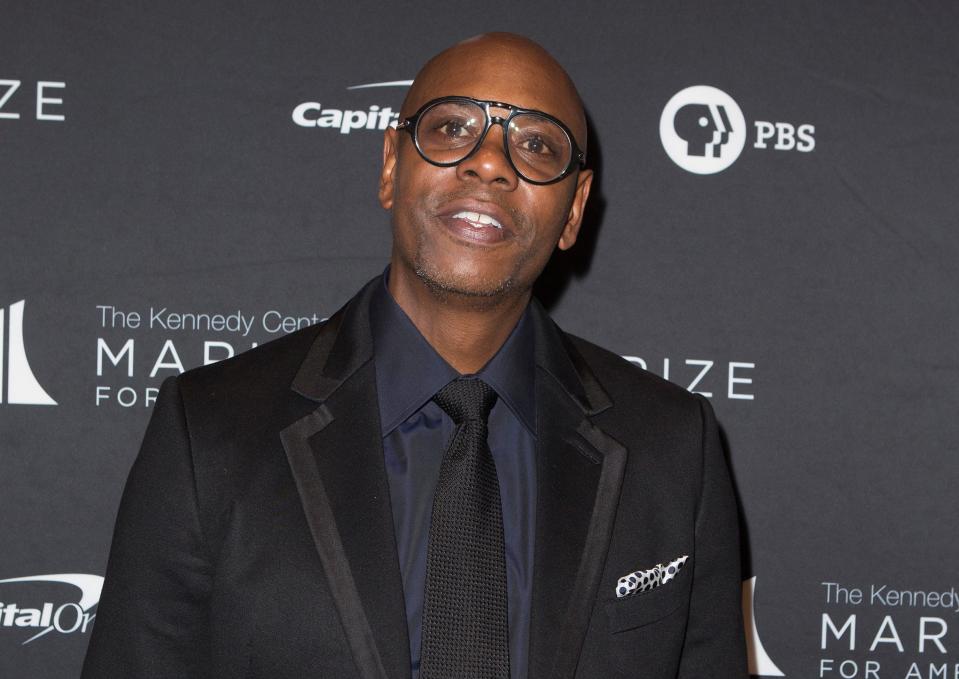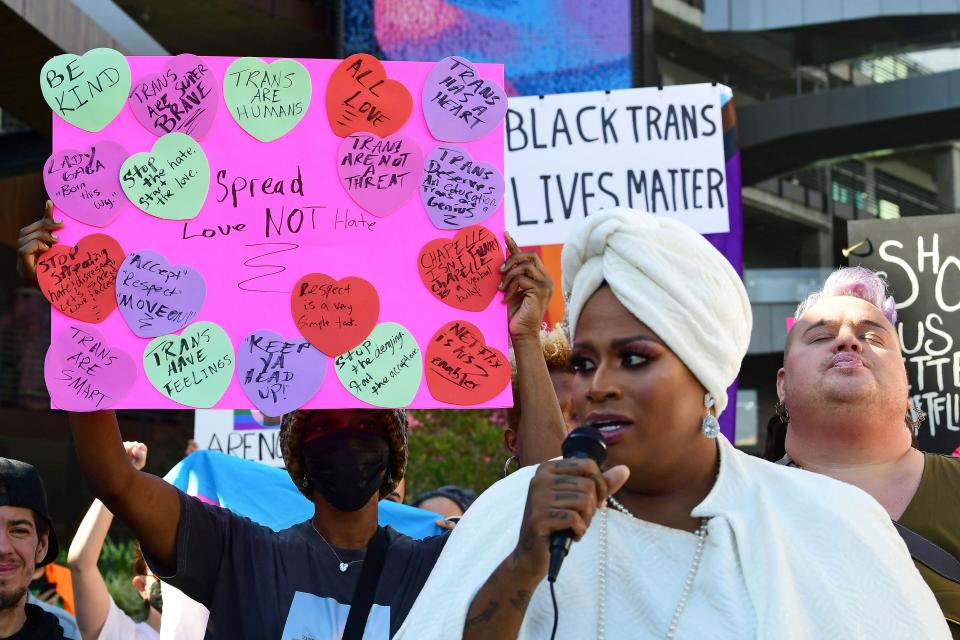Don’t take Dave Chappelle down. Lift transgender voices up.
- Oops!Something went wrong.Please try again later.
- Oops!Something went wrong.Please try again later.
- Oops!Something went wrong.Please try again later.
Stop me if you’ve heard this one: Lenny Bruce, George Carlin and Dave Chappelle walk into a bar to deliver their most controversial material. Lenny Bruce gets arrested (several times). George Carlin gets sent to the Supreme Court. And Dave Chappelle faces the most devastating consequences of all: trending on Twitter.
For as long as the art form of standup has existed, comedians have always pushed the envelope – and accepted the risks that come with doing so. So when Chappelle taped his latest special for Netflix, he undoubtedly knew exactly what he was getting into.
Throughout "The Closer," as Chappelle makes jokes about the LGBTQ community, he looks mischievously into the crowd, eager to cross the line and face the consequences. Eventually, he says it out loud, plain and simple: "Oh buddy, I’m in trouble now."
Sure enough – to the extent that one of the country’s most wildly successful comedians can get "in trouble" – he has.

Backlash to Chappelle's com
LGBTQ advocacy organizations like GLAAD have condemned the material. A transgender executive producer of the Netflix series “Dear White People” announced she would no longer work with Netflix. And a contingent of Netflix employees organized a walkout in the days that followed.
So who is right? Despite what your social media feed may have you believe, two things can be true at the same time: As a comedian, Chappelle can cross social boundaries and share contentious perspectives. And his critics have the right to push back.
Finke: Netflix walkout over Dave Chappelle is not just a matter of transgender rights and dignity
When it comes to what’s next, Chappelle and his critics hold the answer.
Chappelle has a history of being a lightning rod for controversy. He also happens to be the most recent recipient of the Kennedy Center Mark Twain Prize for American Humor, which I co-founded in 1998 and helped award to him in 2019.
That award celebrates the essential role comedians play in American society: making us laugh, sharing unorthodox ideas and questioning our societal norms. From three seasons of "Chappelle’s Show" to a staggering list of standup specials, Chappelle’s body of work has done all of that and more – and he has achieved it, in part, by finding the line between benign and offensive humor, and defiantly dancing on it time and time again. His willingness to unflinchingly confront and embrace our social taboos – and in doing so, delivering some of the most irreverent sketch and standup comedy of all time – was a key reason why he received the Mark Twain Prize.

'This is what free speech is all about'
But just as that willingness to play with fire has earned Chappelle acclaim, awards and money – so much money – it also brings with it a heightened level of scrutiny. When he does cross a line – as some argue “The Closer” does – it opens the door to pointed criticism, and candid discussions about how comedy can and should be more inclusive.
That’s exactly what we’ve seen happen since the release of the special – and the most interesting conversations have come from within Netflix.
In the leadup to last week’s walkout, Netflix’s trans employees shared a letter with steps they’d like to see the company take next. Notably, they have not asked for Chappelle’s special to be taken down. Instead, they’ve asked for more investment in trans talent, more trans people in leadership roles, and disclaimers before content that is offensive to trans viewers.
Jill Lawrence: Superman will no longer champion 'the American way.' It's sad, but our nation deserves it.
This is what free speech is all about. Different as their opinions may be, both Chappelle and Netflix’s trans employees agree that taking controversial ideas off a platform doesn’t make them disappear. Censorship doesn’t change minds, but bringing more voices to the table can – especially to a platform like Netflix with an audience of more than 200 million viewers. By offering more content reflecting different perspectives and identities, Netflix can open the door to real, lasting change.
Comedy has always served as a way to amplify the voices of society’s underdogs. The more diverse that comedy becomes, the more original perspectives audiences will get to hear – but comedy is at its best when everyone in the crowd gets to laugh.
While we must fervently protect the rights and free speech of marginalized groups, who the best comedy is meant to lift up, we must also protect an entertainer’s right to provoke. Advocating for free speech – and empathy – only works if you do it for everyone.
Cappy McGarr, co-founder of the Kennedy Center Mark Twain Prize for American Humor, is the author of the new book "The Man Who Made Mark Twain Famous."
You can read diverse opinions from our Board of Contributors and other writers on the Opinion front page, on Twitter @usatodayopinion and in our daily Opinion newsletter. To respond to a column, submit a comment to letters@usatoday.com.
This article originally appeared on USA TODAY: Dave Chappelle and Netflix: Help amplify transgender voices

